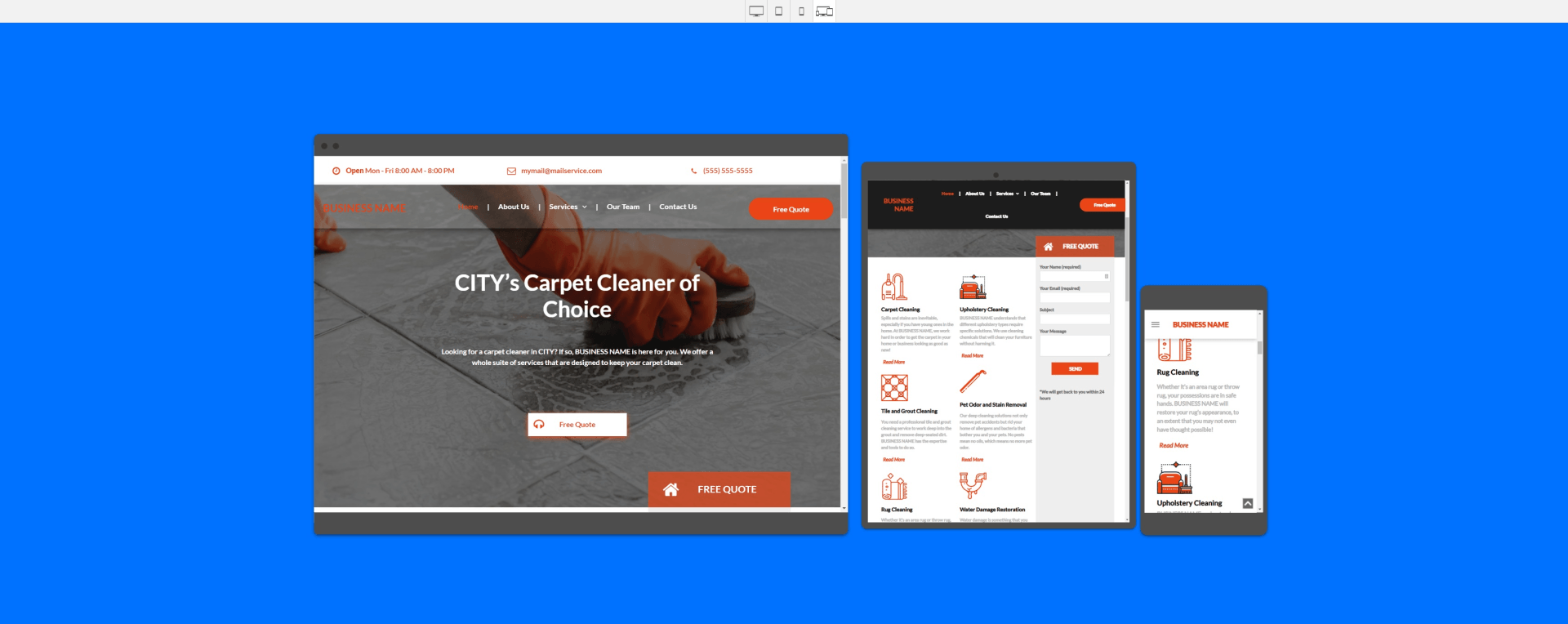
Guide to SEO for Power and Utility Companies
SEO for electrical companies can be a powerful and efficient way of expanding business opportunities and finding new customers, but SEO works a little differently for this industry than it does some others. Here’s what you should know about optimizing your performance on search engines.
Company vs. Electrician
Before we get into discussing SEO, we need to clarify things. As people within the industry know, an electrical company is not the same as an electrician. This is a critical point for understanding how SEO works for it.
An electric company is a business that primarily engages in the production, sale, and distribution of electricity to customers within a particular grid or area. Electric companies may be public utilities, but they can also be separate organizations that sell to utilities. A few electric companies have specialty focuses, such as managing on-site power generators with no grid connections.
Electricians are individuals who typically design, install, and repair electrical systems. Many electricians are independent contractors who work for electric companies and utilities, while others are full-time employees. Electricians who want to advertise their services use different techniques than electrical companies, and this guide does not cover electricians.

What Is SEO?
SEO, or search engine optimization, is the process of creating and adjusting content for the internet (such as landing pages and blog posts) to attract more traffic to the website. The better-optimized a site is, the higher it appears in search results and the more clicks and visitors it will receive.
Most people looking for information on electrical companies focus on two things: familiar names and search engine placement. This setup is great for electrical companies because it’s possible to get more website traffic without being at the top of the list.
People look for familiar names because there are often only a handful of electrical companies serving a particular area. Many places only have a single company. If there’s more, customers will probably deal with a utility that operates as an intermediary instead.
Return on Investment
SEO is fundamentally a form of advertising, which means the most important consideration for your company is its return on investment. Unlike direct marketing campaigns, SEO’s primary value comes with moderate returns over time. Over a year, you may see anywhere from a 50% to 5000% return on your investment.
Realistically, many companies see a return of 600% to 1000% on properly-done SEO. Electrical companies tend to have low-volume, high-value transactions, so even a relatively modest number of additional sales can be a significant return on your investment.
The primary thing to avoid here is doing too much SEO. While that may sound counterproductive, the low number of sales for electrical companies means you can only do so much. Companies don’t casually rewire factories on a whim, you know? It’s not worth spending hundreds or thousands of dollars each day on SEO if your customer base doesn’t allow that.
Don’t forget that most SEO provides its returns over time. Direct advertising has a quick return on investment, but usually in smaller amounts than SEO. Search engine optimization is slower but returns more money.
An ideal setup for many businesses is starting with direct advertising for quick cash, then reinvesting some of the profit (after subtracting business expenses) into SEO to build long-term growth and support. Once the returns from SEO start kicking in, you can use those to fund expansions, more advertising, or nearly anything else.
Keywords
Keywords are a common element of modern SEO. Essentially, search engines read your content to try and understand what your content is about so they can match it to a user’s search intent. Keywords are words and short phrases related to your topic that you can include to help show search engines that your content is relevant.
For example, the keyword for this page is SEO for electrical companies. That’s the subject of this guide, and everything here relates to it. By repeating the phrase several times throughout the article, we can reinforce to the algorithm that it’s the main topic, not just an incidental sentence.
Distortion
Distortion occurs when you try to add too many keywords to content of a given length. The best content is written for humans and looks professional and grammatically correct. If you have too many keywords, the writer has to structure sentences and paragraphs around them, squeezing them in to meet an arbitrary count.
Distortion isn’t a problem if you only have a few keywords, but if you have a hundred keywords for a thousand-word article, that’s essentially demanding multiple keywords per sentence. Even a great writer can’t include so many keywords while still producing good content. Worse, distortion tends to result in lower performance for SEO, so it’s counter-productive.
The important thing to remember here is that while including some keywords is fine, don’t go overboard.

Step One: Define Your Product
Defining your product may sound silly at first. Electrical companies sell electricity, including installing equipment for delivering it under local codes and regulations.
However, is that all there is to your business? If so, you probably don’t need SEO at all. Let me explain what’s going on here.
The primary purpose of SEO is to attract new potential customers to your website and encourage them to convert into paying customers. However, electrical companies have different ways of doing this, and SEO doesn’t make sense for all of them.
If you sell electricity exclusively to a local utility company and have no other clients, SEO doesn’t matter to you. You have no other customers. However, if you’re selling to other clients and businesses, SEO may be relevant to your needs.
That’s why the first step in doing SEO for your electrical company is defining what you’re selling and whether SEO makes sense for advertising it. Common services that qualify include things like wiring new buildings (residential, commercial, or industrial), providing emergency repair services, and installing alternative energy systems like solar panels.
The more services you offer to the public, the more important and effective your SEO will be.

Step Two: Evaluate Your Website
Tools like HubSpot’s Website Grader can give you a quick look at your website's basic structure and performance, including elements that affect SEO and overall performance. As an electrical company, you probably don’t need to use HubSpot’s full services, so you can ignore their ads and focus on their free tools.
If you haven’t upgraded your website in the last few years, and many electrical companies haven’t, then you probably won’t get a good score. Website checkers will be looking at things like mobile-friendliness, site loading speed, and basic security features. If your site’s new, you’re probably in good shape here and can move on to the next step.
If your score is poor, though, it’s time to redesign your site. Online website builders like
Wix and
WordPress can help you do it yourself, offering templates and basic design systems that will help you customize your site and improve your SEO.
For the best performance, however, consider hiring a professional website designer to create the site. Professionals can offer better results than using a basic template, including giving you more control over its exact appearance. If you have enough potential customers to do SEO, it’s worth investing in a professional website redesign.
The reason we’re starting with evaluating your website is because the technical parts of your site have a significant impact on SEO performance. You can see the effect on two primary levels.
First, search engines like Google can tell which websites are made well. If your website is fresh and modern, Google will elevate it over old, out-of-touch designs.
Second, users will see the visual parts of your site. If your website looks modern and approachable, it will perform significantly better than a site that looks like it’s from the early 2000s. Customers don’t trust websites that look too old.
However you make your site, try to ensure you can install any relevant plugins to boost SEO performance. Many companies use software like
Yoast, but if you don’t want to choose plugins yourself, a professional website designer can give some recommendations. That’s another reason to hire someone who knows what they’re doing.

Step Three: Create An SEO Plan
An SEO plan is a strategy to attract new customers to your business. Unlike some other companies, which want to sell the highest volume of products possible, electrical companies usually have limited sales opportunities and do better with upselling additional services rather than trying to sell to more people.
For this plan, start by identifying each of the products you want to advertise through SEO, then consider the types of customers you have. Many businesses create
buyer personas for this, and these can help you target your customers better.
If you’re unfamiliar with them, buyer personas are examples of customers that include details like their motivations and pain points. By understanding what drives the decision-making process for customers, you can tailor your SEO to narrow in on those issues and thereby improve performance.
Let’s look at the primary customers you’re likely to see.
Persona: Brand Fans
Brand fans are relatively rare for electrical companies, but they can be powerful supporters if they’re in the right spot. A brand fan is usually someone who already has experience buying from you and recommends you to their customers.
One example of a brand fan is a local electrician who suggests your company as a source for larger equipment and supplies on a project. Customers often go with a contractor’s recommendations, so a secure partnership with a brand fan can significantly improve your sales over time.
SEO doesn’t affect brand fans very much because they’re already customers. However, it can attract the types of people who can become brand fans, and that’s where the real value and return on your investment lies. To achieve this, you’ll want to create content that specifically appeals to anyone who can recommend your services.
Many electrical companies offer commissions or other incentives to brand fans. Giving them a financial interest in supporting you can help them put you ahead of other competitors. If possible, try to at least match any other commissions they’re offered, as this will keep you on a level playing field with other electrical companies.
Persona: Replenisher
A replenisher is a frequent customer of your products, with frequent purchases in varying quantities. For electrical companies, a replenisher may be buying something like wiring or electrical panels for their jobs.
Replenishers are similar to brand fans in that they buy from a single source because they trust it and want that reliability. However, they tend to have a little less emotion and a little more practicality than a typical brand fan.
For SEO, one of the best ways of appealing to replenishers is by offering deals that relate to their interests. For example, they tend to like free shipping (if they don’t pick things up in person), and they like convenience for their frequent orders.
Replenishers also respond well to reward programs where they can get a small prize by ordering enough. You can’t easily upsell a replenisher because they know what they need and aren’t going to buy more, so reward programs encourage them to spend money exclusively at your store.
If they’re an especially high-value customer, consider offering unique services or benefits to help them. For example, they could earn an overnight delivery (or emergency personal delivery from your company, if they’re nearby) for times when they need something fast.
Persona: Researcher
Researchers like to gather as much information as possible before they make their decisions. These are common at larger companies, which may employ someone specifically to evaluate different options and make a recommendation.
Researchers don’t just want to get a good deal, they’re going to run the numbers and compare products to ensure it. The best way to sell to researchers is by providing information about the products and how they will benefit the customer. Case studies and reviews are also helpful, as researchers tend to value social proof for anything they buy.
Researchers appreciate comparison tables that show the differences between your products and services. They also appreciate it when you make the basic information easy to find. For example, if you can define your products as suitable for businesses with X number of employees, that can help a researcher home in on the products they’re looking for.
It can be hard to convince a researcher to become a customer, but once you do, they tend to be loyal and reliable. They’re confident in their decisions because they’ve put in the work, so solid customer service after they make their purchase can reinforce their feelings and convince them to stick with your company.
This is the other side of research and one that many companies forget about. Researchers like known quantities. If they have an outstanding experience with you, that elevates you above other companies they have no experience with. If they keep buying from you, it’s for reliability, and they’ll often continue the relationship until you do something to lose their trust.
Persona: Value Hunter
Value hunters are always looking for the best deal when they go shopping. This doesn’t mean they buy exclusively by price, though. Instead, value hunters are usually looking to get the best quality and performance for what they spend.
Typical value hunters for electrical companies include businesses, who usually want to keep contracting costs as low as possible. If you work with commercial or industrial companies, you may be able to appeal to value hunters through things like discounted membership programs or priority customer support.
Value hunters also like products that have long, reliable lifespans. Advertising products as low-maintenance or including protection policies can further appeal to their sensibilities and convince them to buy from you.
Other Personas
The buyer personas above aren’t the only ones on the market. There are quite a few other buyer personas, but most of them aren’t relevant to electrical companies.
Remember, customers may change their buyer personas depending on what they’re doing. Some people are gifters or mobile shoppers, for example, but may become researchers when it’s time to buy expensive electrical services.
Don’t be afraid to talk to your customers, offer surveys, or use other tools to gain information about them.

Step Four: Narrow Your Targeting
At this point in the process, it’s easy to have a wide net. You know what your buyer personas are and what you’re trying to sell, so all that’s left is to make content, right? No. We need to narrow things down a little.
SEO tends to be more effective when you target potential customers as specifically as possible. For electrical companies, this may be something like targeting a researcher for a small business that’s interested in repairing a specialist manufacturing environment that uses a lot of electricity.
The best way to narrow your targeting is to borrow from journalism and identify the specific attributes to use for each content.
Who are you selling to? The first question to ask is who you’re targeting with a piece of content. Is it a household customer, a local business, a government organization, or someone else? Customers tend to have specific interests that may not overlap, so you want to figure this out first.
What are you selling? What specific product or service are you trying to sell to your customers? SEO tends to be most effective when you only try to sell one thing at a time. If it’s not what customers are looking for, they’ll just leave, rather than scroll down to check for alternatives. Try to make it clear who a product is for and what it does up-front.
When can you deliver your products and services? Electrical companies may need time to build things or schedule deliveries. Customers have different preferences for speed, too. Is there anything you can do to reduce the time for delivery?
How are you selling it to them? Are you selling the products online, by phone or email, or even in person? Customers usually look for the easiest ordering process possible, so your goal is ultimately to funnel them to the ordering style that works for their preferences and habits.
Remember, researchers may want to talk to a representative for more information, while replenishers want an easy way to get everything on their list. What they tend to order can affect how you sell it to them.
Where are you selling to? Many electrical companies focus on local sales. You can have a tough time selling copper wire across the country when a buyer can walk into a local store instead and have it right away, you know? Knowing where your customers are can influence things like your delivery options and promotional opportunities.
Why should they buy from you? What makes buying from your company better than going to any competitors? Do you have any
unique value propositions to set you apart from others, and if not, can you create one? Remember that you’re targeting specific buyer personas, so your proposition should appeal to their specific values and desires.

Step Five: Check Your Types Of Content
You can use many types of content for SEO, but only a few are usually effective for companies.
Short-Form Content
Short-form content is written material like blog posts, landing pages, and product descriptions that are less than 1500 words overall (about three written pages). This content is meant to be quick and easy for readers to digest, and it works best with long-tail keywords that don’t have much competition. Short content is also much more affordable.
Long-Form Content
Long-form content is written material that’s over 1500 words, mainly including blog posts and occasional ebooks. You’re reading long-form content right now, and the fact that you are shows how well it works.
Search engines tend to prefer in-depth discussions of individual topics, so long-form content can perform better even if it’s not quite as user-friendly as shorter material.
People who buy from electric companies tend to do research (even if they’re not quite a researcher persona), so try to use your content to identify what the product does and make it clear whether it’s what a potential customer is looking for. If they can’t figure out if the product is right for them, you’ve got problems.
Pillar Content
Pillar content is similar to long-form content, usually targeting valuable keywords. These are central pages for your site that can link out to other content and help people find exactly what they’re looking for.
Pillar content should be as evergreen as possible, meaning that it remains accurate and relevant instead of being seasonal or time-limited.

Step Six: Create Your Content
Once you know the details of the content and how long you want it to be, it’s time to create the content. Most companies outsource this to a professional writer who can make the final content as good as possible, but you can also do it in-house if you hire someone good at writing.
SEO works best over time. While you can outsource content in practically any amount you can pay for, it’s usually best to post it over time and try to attract people steadily, rather than releasing it all at once and then ignoring it.
Once you’re done creating the content, monitor its performance with software like
Google Analytics to see what works, and use that to inform your future content orders.

SEO for power and utility companies may not be the same as SEO for many industries, but if you’re selling any products or services that can benefit from it, it’s worth doing. Remember, focus on understanding what customers care about, then tailor your content to address their concerns and show that your products are the best choice.







Unlock the Unlimited Potential of Your Business
Our professionals stop at nothing to provide excellent digital marketing solutions.
Do you want your business to be found all over online? Small Biz SEO can help. We are a marketing company that specializes in SEO for small business growth. Our team of SEO experts can help you get the most out of your website and increase your online visibility.
Our Services
All Rights Reserved | Small Biz SEO






















